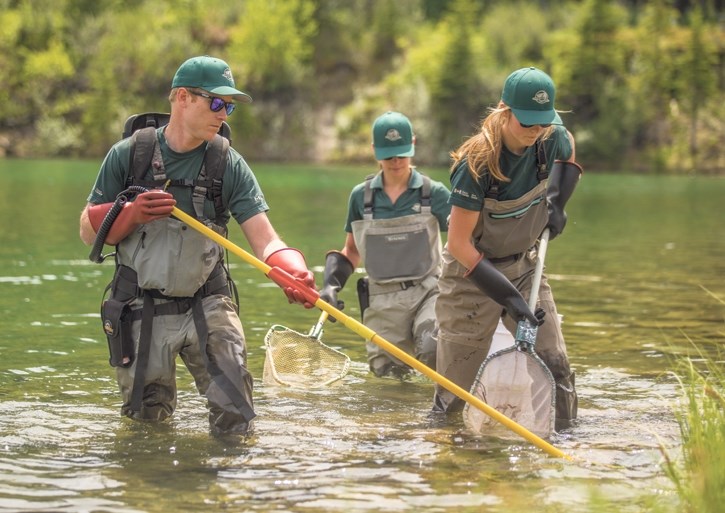YOHO & KOOTENAY – Kayaks, canoes and stand-up paddleboards must be cleaned, drained and dried before use in Yoho and Kootenay national parks under a new rule to prevent the spread of invasive mussels and whirling disease.
Parks Canada has implemented a mandatory self-certification permit program, which requires watercraft be cleaned and drained of water, mud and debris and dried for a minimum of 48 hours before use in any lake or river in the two mountain parks.
Shelley Humphries, aquatics specialist for Lake Louise, Yoho and Kootenay national parks, said aquatic invasive species are introduced through activities such as canoeing, kayaking, stand-up paddle boarding and fishing.
“Invasive species alter aquatic ecosystems, cause irreversible damage and impact already vulnerable species at risk, such as the westslope cutthroat trout,” she said.
“They’re incredibly devastating and we really need people to get all the water and mud and debris out so there’s no possibility of transmission.”
The mandatory permit applies to any a canoe, kayak, raft, stand-up paddleboard or inflatable boat or toy, as well as fishing equipment like rods, tackle, waders, wading boots and gloves. Lifejackets, throw bags, water shoes, wetsuits and water toys are also included.
Self-registration permits and questionnaires will be available at visitor centres, campgrounds and popular boat launching spots throughout Yoho and Kootenay national parks.
Anyone caught without the mandatory permit may be charged and face a maximum penalty of $25,000 in court.
“When people fill out their permit, they keep part of it and put the rest in the information box,” Humphries said.
“They do need to keep it with them and if they’re stopped by a warden and asked to produce it, then they do need to produce it. If they’re not able to, then it is enforceable.”
Quagga and zebra mussels were introduced by trans-continental shipping from the Baltic Sea to the Great Lakes region of Canada and the United States in the 1980s.
These mussels have spread in Ontario and Quebec and have been discovered in Lake Winnipeg, Manitoba. They are also found in many American states as far west as California.
Humphries said they have not yet spread to B.C. or Alberta.
“We do know provincial inspection stations are intercepting boats that are contaminated with them,” she said.
According to experts, zebra and quagga mussels filter water to the point where food sources such as plankton are removed, altering food webs.
“It has the ability to really restructure the food web in a way that won’t be good for our native fish,” Humphries said.
“We do have native fish that are in trouble and need extra protection, so we’re worried about this impacting our westslope cutthroat trout and bull trout in particular.”
The spread of whirling disease is also a big concern.
In 2016, whirling disease was detected in Johnson Lake in Banff National Park and has since been confirmed in many creeks and rivers throughout Alberta, including the Bow, Oldman, North Saskatchewan and Red Deer watersheds.
Named for the circular swimming patterns of infected fish, whirling disease can affect several fish species, including bull trout and westslope cutthroat trout as well as rainbow trout, mountain whitefish, brown and brook trout.
“We are, of course, worried about whirling disease and it’s in some locations in Banff,” Humphries said.
“So far, we don’t have it anywhere in Yoho or Kootenay, or British Columbia for that matter, so we’re worried it could potentially get transferred across the Divide.”
Whitefish are highly susceptible to whirling disease.
“They’re the base of the food chain. A lot of the other fish eat them so we really want to keep our whole food web as intact as possible,” Humphries said.
The new rules don’t apply to Banff National Park.
“Right now, we’re focusing on Yoho and Kootenay because they’re really the gateway into British Columbia,” Humphries said.




